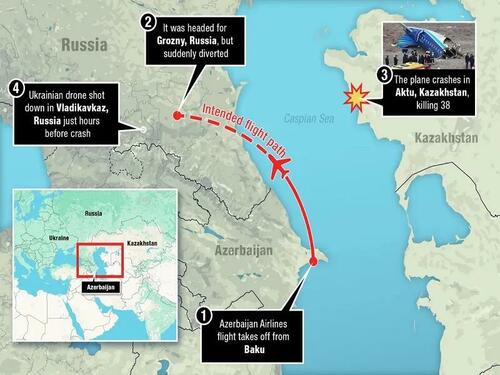Authored by Andrew Korybko via substack,
CNN cited an unnamed US official to report that the crash of Azerbaijan Airlines flight J2-8243 in Kazakhstan, which was traveling from Baku to Grozny before suddenly veering off course towards the Caspian Sea, might have been caused by Russian air defenses mistakenly firing on it.
Kremlin spokesman Dmitry Peskov cautioned against indulging in speculation and to wait until the investigation is concluded, but his advice obviously went unheeded by the US, which has an interest in shaping the narrative.
In this case, it wants to absolve Ukraine of responsibility after it turned out that it had launched long-range drone strikes on Grozny around the time of the incident, which could have either led to Russian air defenses mistakenly firing on the plane or the shrapnel from a destroyed drone could have hit it instead. RT reported that the preliminary investigation hypothesized that a bird strike was to blame, but footage of the crashed plane appearing pockmarked prompted speculation that something else happened.
The viral spread of CNN’s report, which carries an air of authority for some since it cites an unnamed US official, necessitates that it be challenged despite Peskov cautioning against any speculation.
The sequence of events that unfolded does indeed suggest that something happened in the air on the way to Grozny that resulted in the plane suddenly veering off course towards the Caspian, but the post-crash footage suggests that it might have been hit by drone debris instead of a direct air defense hit.
Regardless of whichever explanation one deems to be more credible, the point is that both were caused by Ukraine’s reckless drone attacks against Grozny, which is far away from the special operation zone.
This week’s weren’t the first, and the reason why that city has been targeted likely has to do with Ukraine’s belief that these attacks can spark political unrest in that formerly separatist region, thus opening up a so-called “second front” for diverting Russia’s attention and forces from the primary one.
A supplementary objective can be intuited by what a top Ukrainian official told CNN in their report.
Andrey Kovalenko, who’s the head of the “Center for Countering Disinformation” that’s part of the National Security and Defense Council, told them that “Russia should have closed the airspace over Grozny but failed to do so.”
In other words, these drone attacks were deliberately meant to create an unsafe environment, which would either coerce Russia into closing its airspace or cause a tragedy.
Closing its entire southern airspace indefinitely as a precaution due to the long range of Ukrainian drones would have objectively been an overreaction with incalculable financial costs just like if the US would have done the same in response to mysterious drone sightings over the East Coast earlier this month.
Nevertheless, precisely because Russia didn’t do so, Ukraine and its media allies will now predictably claim that this was irresponsible after what happened even though Kiev is to blame as explained.
What Russia needs to do as soon as possible is push back against this emerging information warfare narrative by maximally emphasizing how reckless it is for Ukraine to carry out drone attacks so far away from the special operation zone, let alone against civilian infrastructure like local airports.
Pandora’s Box of speculation was already opened by the US and Ukraine so there’s no need for Russia to restrain itself from injecting its own speculation, albeit that which is much more reasonable, into the global discourse.
